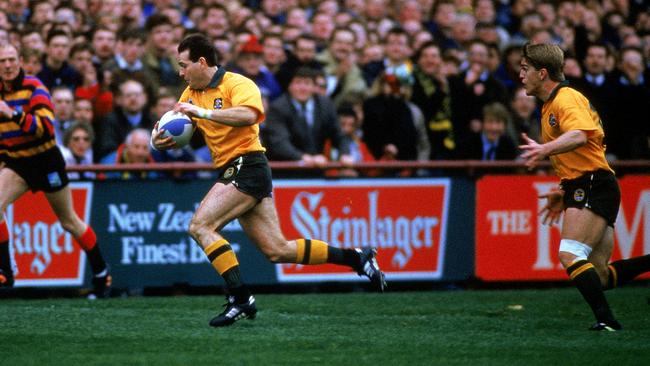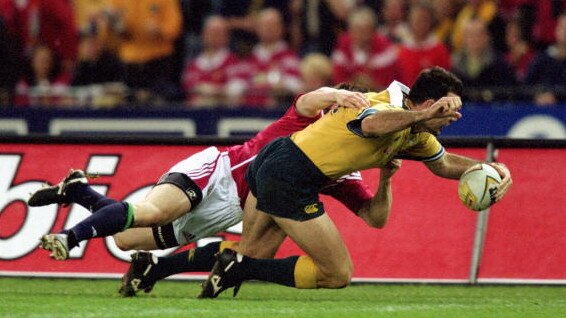Wallabies’ golden days with David Campese and Mark Ella to light the way
Rugby in Australia hasn’t always been a basket case, and here’s a handful of examples to prove the point.

Thriller for the masses
Australia, and Sydney in particular, was buzzing in the Olympic year, and the first Bledisloe Test of 2000, played at the Olympic Stadium in July, was a classic.
Played in front of a world record crowd for a rugby match – 109,874 – the trans-Tasman rivals went at it like two heavyweight boxers determined to slug it out without taking a backward step.
The All Blacks scored three tries in the opening five minutes and led 24-0 after eight. But the 1999 World Cup winners fought back incredibly to level matters at 24-24 by halftime.
The opening half featured seven tries, but the intensity didn’t drop after the break as the lead swapped sides before Jeremy Paul put Australia ahead 35-34 with three minutes left on the clock. Still time for one more twist though as with the last attack of the game, Jonah Lomu danced his way down the touchline to score: 39-35 to New Zealand.
The match was billed by many as the greatest Test ever played. For me, as a recent arrival in Australia, I thought rugby down under would always be this good.
Campo’s big day out
David Campese stole the show at the 1991 World Cup, and in no game did he shine brighter than the semi-final against the All Blacks in Dublin, scoring one try and making the other as the Wallabies put an end to New Zealand’s hopes of defending their title.
Campo came off his right wing to score his try, popping up in the five-eighth channel as Australia shifted the ball left. From just outside the 22, he ran an angled line towards the left corner and made it to the line without a defender laying a hand on him.
But the best was still to come for Australia’s second try. Michael Lynagh prodded a kick into space on the right, Campese collected, after weaving right then left, flicked the ball over his right shoulder without looking where Tim Horan, running brilliantly in support, grabbed the ball and ran in to score.
Leading 13-0 at halftime, the Wallabies held New Zealand to just two penalty goals to win 16-6. A week later they beat England at Twickenham to lift the World Cup for the first time.

Grand Slam magic
The Wallabies rounded off the historic grand slam tour of 1984 with a 37-12 demolition of Five Nations champions Scotland at Murrayfield.
In four Tests Australia scored 100 points, running in 12 tries and only conceding one.
The star of the tour was Mark Ella, standing flat and close at five-eighth and wreaking havoc with his distribution and superb support running.
In a four-try rout of the Scots, Nick Farr-Jones scored his first try for Australia, David Campese bagged a brace and Ella scored the other to complete a personal grand slam of tries for the series.
As a schoolboy player brought up on a diet of England relying on Dusty Hare’s trusty right boot, seeing Ella in action was a revelation.
A few months after the tour he quit, age 25, but what a legacy he and the 1984 side left behind.
Lions tamed
In 2001 Australia hosted the first of the super-sized British Lions tours, with more than 20,000 Lions fans making the trip down under.
And they made their presence felt in the first Test at the Gabba, roaring the Lions home in an ambush against a backdrop of red shirts and scarfs.
But the Wallabies and their fans lifted their game for the second Test at Colonial Stadium in Melbourne, with Joe Roff playing the decisive role in a 35-14 win.
The Lions led 11-6 at halftime, but just two minutes after the break, Roff picked off a long Jonny Wilkinson pass aimed at Rob Henderson and won the sprint for the line against Brian O’Driscoll by a whisker.
It was the try that turned the series in Australia’s favour, and they completed the job in Sydney a week later.

False dawn
The 47-26 beating of the All Blacks in Perth last year was probably the finest Wallabies performance of the Michael Cheika era.
Cheika, as was his wont, experimented by picking James O’Connor at outside centre, his first Test start in the No 13 jersey. It was a call that raised eyebrows but paid off handsomely as O’Connor was superb, putting Reece Hodge in for two of Australia’s six tries.
Yes, the All Blacks were down to 14 men for the second half, but nonetheless Australia’s performance suggested great things to come.
But just six weeks before the World Cup in Japan, this proved to be the falsest of dawns. Where did it all go wrong?
More Coverage







To join the conversation, please log in. Don't have an account? Register
Join the conversation, you are commenting as Logout